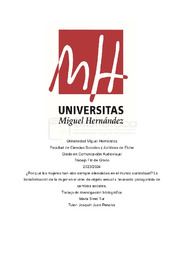Please use this identifier to cite or link to this item:
https://hdl.handle.net/11000/33311Full metadata record
| DC Field | Value | Language |
|---|---|---|
| dc.contributor.advisor | JUAN-PENALVA, Joaquín | - |
| dc.contributor.author | Simó Tur, Maria | - |
| dc.contributor.other | Departamentos de la UMH::Ciencias Sociales y Humanas | es_ES |
| dc.date.accessioned | 2024-09-27T07:37:22Z | - |
| dc.date.available | 2024-09-27T07:37:22Z | - |
| dc.date.created | 2024-06 | - |
| dc.identifier.uri | https://hdl.handle.net/11000/33311 | - |
| dc.description.abstract | El feminismo y el audiovisual son dos campos que han estado interconectados de varias maneras a lo largo de la historia. El feminismo, como movimiento social y político, ha buscado cuestionar y transformar las desigualdades de género y promover la igualdad entre hombres y mujeres. El audiovisual, por su parte, incluye una amplia gama de medios visuales, como el cine, la televisión, el videoarte y el contenido en línea, que pueden influir significativamente en la forma en que se representa y se percibe a las personas, especialmente a las mujeres. Por tanto, este trabajo de investigación tiene como objetivo primordial analizar la representación que la figura femenina ha sufrido a lo largo de los años en el ámbito audiovisual, más concretamente, en el cine. Así, desde una investigación principalmente cualitativa, se ha concluido que los estereotipos se forman poco a poco y eliminarlos lleva tiempo y es preocupante ver cómo los medios de comunicación promueven ideas equivocadas que afectan a la sociedad. Por eso, este trabajo es solo una pequeña ayuda en el gran esfuerzo de encontrar y hablar sobre estos estereotipos para tratar de detener su impacto negativo. | es_ES |
| dc.description.abstract | Feminism and audiovisuals are two fields that have been interconnected in various ways throughout history. Feminism, as a social and political movement, has sought to challenge and transform gender inequalities and promote equality between men and women. Audiovisual, on the other hand, includes a wide range of visual media, such as film, television, video art and online content, which can significantly influence the way people, especially women, are represented and perceived. Therefore, the main objective of this research work is to analyze the representation that the female figure has suffered over the years in the audiovisual field, more specifically, in cinema. Thus, from a mainly qualitative research, it has been obtained that stereotypes are formed little by little and it takes time to eliminate them and it is worrying to see how the media promote wrong ideas that affect society. Therefore, this work is only a small help in the great effort to find and talk about these stereotypes in order to try to stop their negative impact. | es_ES |
| dc.format | application/pdf | es_ES |
| dc.format.extent | 40 | es_ES |
| dc.language.iso | spa | es_ES |
| dc.publisher | Universidad Miguel Hernández de Elche | es_ES |
| dc.rights | info:eu-repo/semantics/openAccess | es_ES |
| dc.rights | Attribution-NonCommercial-NoDerivatives 4.0 Internacional | * |
| dc.rights.uri | http://creativecommons.org/licenses/by-nc-nd/4.0/ | * |
| dc.subject | Identidad | es_ES |
| dc.subject | Género | es_ES |
| dc.subject | Educación Mediática | es_ES |
| dc.subject | Feminismo | es_ES |
| dc.subject | Cine | es_ES |
| dc.subject | Identity | es_ES |
| dc.subject | Gender | es_ES |
| dc.subject | Media Education | es_ES |
| dc.subject | Feminism | es_ES |
| dc.subject | Cinema | es_ES |
| dc.subject.other | CDU::7 - Bellas artes::77 - Fotografía. Cinematografía | es_ES |
| dc.title | ¿Por qué las mujeres han sido siempre silenciadas en el mundo audiovisual? La transformación de la mujer en el cine: de objeto sexual a necesaria protagonista de cambios sociales | es_ES |
| dc.type | info:eu-repo/semantics/bachelorThesis | es_ES |

View/Open:
SIMÓ TUR MARIA.pdf
3,26 MB
Adobe PDF
Share:
.png)
